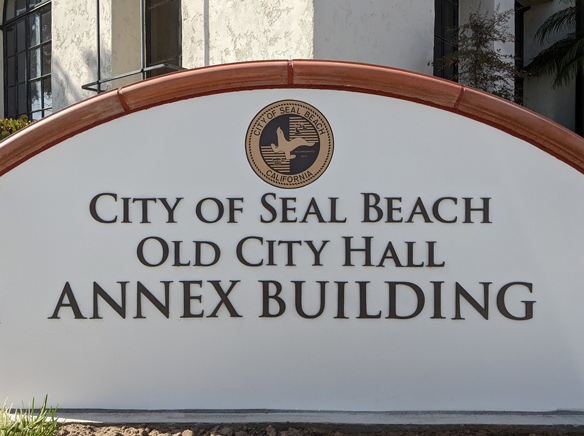For the first time, on Monday, March 11, the city government had Seal Beach residents fill out speaker cards before the public comment part of the City Council meeting.
District Four Council Member/Mayor Schelly Sustarsic announced the news at the start of the meeting.
“If you wish to speak, we ask that you fill out a speaker card, available from the city clerk and turn it in,” Sustarsic said.
“You’re not required to complete the card but the purpose of them is to ensure the speaker’s name is properly recorded in the meeting minutes,” Sustarsic said.
“The speaker card is a public record and is subject to disclosure under the Public Records Act,” Sustarsic said.
The form, which was on the City Clerk’s desk, specifically states: “The purpose of this card is to ensure that the speaker’s name is properly recorded in the meeting minutes and for staff follow up.” In bold, it states: “This document is a public record and is subject to disclosure under the Public Records Act.”
Underneath the space for the person’s name, the form notes that the speaker’s address, city, phone number and email are “optional.”
However, California law allows members of the public to remain anonymous when they speak to government bodies.
“Public speakers cannot be compelled to give their name or address as a condition of speaking,” according to “Open & Public V: A Guide To The Ralph M. Brown Act” published by the California League of Cities.
“The clerk or presiding officer may request speakers to complete a speaker card or identify themselves for the record, but must respect a speaker’s desire for anonymity,” according to “Open & Public V.”
“Moreover, the legislative body cannot prohibit public criticism of policies, procedures, programs, or services of the agency or the acts or omissions of the legislative body itself. But the Brown Act provides no immunity for defamatory statements,” according to “Open & Public V.”
The speaker card will not be limited to council meetings but to all “legislative bodies” of the Seal Beach city government. The form specifically lists “City Council, Commission, Committees, Boards, Foundations.”
The form also asks the public to fill in the name of the legislative body the individual wants to address. Below that, the speaker card provides circles to check or fill out to specify whether the speaker wants to talk during “oral communications” (public comment) or a public hearing.
The form then asks the speaker to “select one (1) or both,” followed by “Agenda Item No. ____” and “Topic: _____________.” The form provides space for the speaker to select two agenda items to discuss.
There were no public hearings at the March 11 council meeting. There were five items on the agenda. All five items were on the Consent Calendar, which was approved without discussion.
Seal Beach Lion John Schroeder spoke to the council without filling out the speaker form.
During the public comment part of the council meeting, Sustarsic read the names of those individuals who did write their names on the form before they came up to the podium to talk to the council.
The Sun has emailed questions about this new policy to the city attorney, the city manager, and Mayor Sustarsic.
The Sun has filed a California Public Records Act request for all council, staff, and consultant emails about having the public fill out speaker cards. Because the city by policy retains emails for 90 days, the Sun requested emails for the 90 day period prior to Tuesday, March 12.




